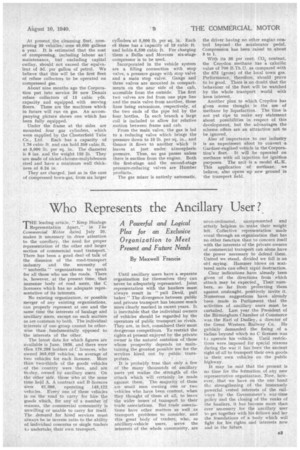Who Represents the Ancillary User?
Page 21

If you've noticed an error in this article please click here to report it so we can fix it.
THE leading article, " Keep Haulage Representation Apart," in The Commercial Motor dated July 20, makes it necessary to draw attention to the corollary, the need for proper representation of the other and larger section of commercial road transport.' There has been a good deal of talk of the disunion of the road-transport industry and the necessity of "
umbrella" organizations to speak for all those who use the roads. There is, however, at the present time, that immense body of road users, the C licensees which has no adequate representative of its interests.
No existing organization, or possible merger of any existing organizations, can properly represent at one and the same time the interests of haulage and ancillary users, except on such matters as are common to both. The individual interests of one group cannot he otherwise than fundamentally opposed to the interests of the other.
The latest date for which figures are available is June, 1938, and there were then 178,298 holders of C licences, who owned 365,025 vehicles, an average of two vehicles for each licensee. More than two-thirds of the goods vehicles of the country were then, and are to-day, owned by ancillary users. On the other side, those who at the same time held A, A contract and B licences Were 61,086, operating 148,122 vehicles. Every one of these vehicles is on the road. to carry for hire the goods which, for any of a number of reasons, the commercial community is unwilling or unable to carry for itself. The demand for hired services mustalways be in inverse ratio to the ability of individual concerns or single traders to undertake their own transport.
Until ancillary users have a separate organization for themselves they can never be adequately represented. Joint representation with the hauliers must always result in" pull Devil, pull baker." The divergence between public and private transport has become much more clearly marked in recent years. It is inevitable that the individual owners of vehicles should be regarded by the operators of public transport as rivals. They are, in fact, considered their most dangerous competitors. To restrict the rights at present enjoyed by the private owner is the natural ambition of those whose prosperity depends on maintaining the greatest possible use for the services hired out by public transporters.
It is probably true that only a few of the many thousands of ancillary users yet realize the strength of the attack which will certainly be made against them. The majority of them are small men owning one or two vehicles who have been content, when they thought of them at all, to leave the wider issues of transport to their trade associations. But trade associations have other matters as well as transport problems to consider, and this great body of traders, who, as ancillary-vehicle users, serve the interests of the whole community, are or co-ordinated, unrepresented and
utterly helpless to., make their weight felt. Collective representation made vocal through an organization that has no other function than to concern itself with the interests of the private owners of commercial transport can alone have the power necessary to defend them. United we stand, divided we fall is an old saying. Hammer blows on scattered units can effect rapid destruction.
Clear indications have already been given of the directions from which attack may be expected. Their numbers, so far from prolecting them against onslaught, positively invite it., Numerous suggestions have already been, made in Parliament. that the activities of ancillary users must be curtailed. Last year the President of the Birmingham Chamber of Commerce was the Earl of Dudley, a director of the Great Western Railway Co. He publicly demanded the fixing of a radius beyond which no C licensee was t...) operate his vehicle. Until restrictions were imposed for special reasons during the war it has been the ancient right of all to transport their own goods in their own vehicles on the public highway.
It may be said that the present is no time for the formation of any new representative organization. Now, however, that we have on the one hand thc strengthening of the immensely powerful vested interests of the railways by the Government's war-time policy and the closing of the ranks of the hauliers, it has become more than ever necessary for the ancillary user to get together with his fellows and lay the foundations of a body which will fight for, his rights and interests now and in the future.




















































